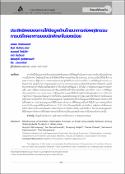บทคัดย่อ
งานวิจัยนี้มีวัตถุประสงค์เพื่อประเมินประสิทธิผลของการให้ข้อมูลด้านโภชนาการต่อการปรับเปลี่ยนพฤติกรรมการบริโภคอาหาร โดยมีกลุ่มเป้าหมาย คือ นิสิต/นักศึกษาจากมหาวิทยาลัย 3 แห่ง รวม 375 คน ระเบียบวิธีวิจัย คือ การทดลองภาคสนาม ที่ผู้เข้าร่วมการทดลองแต่ละคนจะถูกสุ่มให้ได้รับแบบสอบถามหนึ่งใน 12 ชุดที่มีข้อมูลด้านโภชนาการที่แตกต่างกัน โดยผู้เข้าร่วมการทดลองจะเลือกรายการอาหารจากแบบสอบถามที่ตนได้รับสองสัปดาห์ติดต่อกัน และได้รับอาหารตามรายการที่เลือกในทั้งสองสัปดาห์ วิธีการวิเคราะห์ข้อมูลมี 2 วิธี ได้แก่ การทดสอบความแตกต่างของค่าเฉลี่ย และการใช้สมการถดถอยประมาณค่าสัมประสิทธิ์ด้วยวิธีกำลังสองน้อยที่สุด ผลการศึกษา พบว่า การให้ข้อมูลปริมาณแคลอรีของรายการอาหารและการให้ข้อมูลปริมาณแคลอรีที่พึงบริโภคต่อวันไม่มีผลต่อพฤติกรรมการบริโภค ไม่ว่าผู้เข้าร่วมการทดลองจะเห็นเมนูอาหารกี่ครั้งก็ตาม คุณสมบัติของเมนูอาหารรูปแบบเดียวที่ทำให้เกิดการเปลี่ยนแปลงพฤติกรรมการบริโภคก็คือ วิธีการนำเสนอเมนูแนะนำ โดยเมื่อเปรียบเทียบกับเมนูแนะนำที่มีลักษณะทางโภชนาการที่ไม่ดีต่อสุขภาพ การนำเสนอเมนูแนะนำที่มีลักษณะทางโภชนาการที่ดีต่อสุขภาพมีผลทำให้ผู้เข้าร่วมการทดลองบริโภคอาหารในปริมาณแคลอรีที่น้อยลงถึงประมาณ 73.97-105.4 กิโลแคลอรีต่อมื้อ อย่างไรก็ตาม ผลดังกล่าวเกิดขึ้นเฉพาะในสัปดาห์แรกเท่านั้น และไม่มีผลต่อการเลือกบริโภคอาหารในสัปดาห์ที่สอง แสดงให้เห็นว่า วิธีการนำเสนอเมนูแนะนำที่มีลักษณะทางโภชนาการที่ดีต่อสุขภาพอาจก่อให้เกิดการเปลี่ยนแปลงพฤติกรรมการบริโภคแบบชั่วคราวเท่านั้น
บทคัดย่อ
The objective of this study is to evaluate the effectiveness of the provision of nutrition informa¬tion on food consumption behavior. Field experiments were conducted on undergraduate students from three universities. The total number of research participants was 375 undergraduate students. Each participant was randomly selected to answer one of 12 possible questionnaires, each with a different set of nutrition information. They were subsequently provided with a meal of their choice. At each university, the experiment was conducted twice, within a one-week interval. Mean differences and regression analyses based on an ordinary least squares (OLS) technique were used. The results show that the provision of calorie information for each item on the menu and the provision of information on daily recommended caloric intake did not have an impact on food consumption behavior. Nevertheless, the selection of dishes into a recommended menu had an effect. Participants who answered questionnaires with healthy recommended dishes were more likely to choose a meal that contained lower calories by 73.97-105.4 Kcal, compared to those who were assigned with a menu highlighting unhealthy recommended dishes. However, the effect was found only in the first week and dissipated by the second week. The implication is that featuring a healthy recommended menu may have only a contemporaneous effect on food consumption.


